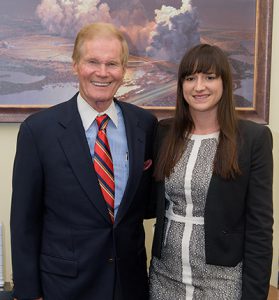By Anna Normand
“How do wetlands store so much carbon?” and “Is muck the proper term to use?” These are the thoughtful questions I was asked on Capitol Hill by none other than Florida Senator Bill Nelson. Fielding these scientific questions, I felt like I was in a qualifying exam answering questions from an external member. After, the other Senate fellows commented, “Senator Nelson sure likes soils!”
 Senator Nelson is the ranking member of the Senate Committee on Commerce, Science, and Transportation, which I work under as a 2016 Sea Grant Knauss Legislative Fellow in the Oceans, Atmosphere, Fisheries, and Coast Guard Subcommittee. Our issues are everything NOAA (National Oceanic and Atmospheric Administration), including the ocean and coast, weather and satellites, and natural resources.
Senator Nelson is the ranking member of the Senate Committee on Commerce, Science, and Transportation, which I work under as a 2016 Sea Grant Knauss Legislative Fellow in the Oceans, Atmosphere, Fisheries, and Coast Guard Subcommittee. Our issues are everything NOAA (National Oceanic and Atmospheric Administration), including the ocean and coast, weather and satellites, and natural resources.
As a Knauss Fellow, my responsibilities are to delve into committee issues and processes; provide scientific expertise and perspective to our team; prepare memos and background documents for hearings, executive sessions, and member decisions; write appropriations letters petitioning for NOAA program funding; and meet with agency representatives, nonprofit organizations, and stakeholder groups. My host office views this fellowship year as a personal learning and development opportunity.
Through Congressional Research Service workshops, I am learning as much as possible about how Congress works so that I can be an asset to agencies and nonprofits in my future career. I have taken advantage of informative briefings for hill staffers and after hour receptions that launch networking opportunities. At one such reception, I listened to Todd Stern, the outgoing U.S. Special Envoy for Climate Change at the State Department, recount negotiating the Paris Climate Treaty, COP 21. Afterwards, I introduced myself to Jonathan Pershing, the new climate envoy, who I will follow to COP 22 in Morocco this fall as part of the Senate delegation. There I will witness international treaty strategy and implementation of the most sweeping climate agreement to date.
In the big picture, I am now aware of something that is hard to envision when immersed in academia – there are so many diverse careers for environmental Masters and Ph.D. graduates! Many times I have tried to answer the question, “What do you want to do after your Ph.D. program?” When the answer is not academia, your career goal may be hard to define. However, after exploring the insides of major (and minor) government agencies, non-profit groups, and the mysterious legislative branch as a Knauss Fellow, I am confident that my career in the science policy sphere is possible with multiple opportunities.
My hope is that more of my peers pursue experiences like the Knauss Fellowship to expand their horizons, network beyond academia, and advance their career opportunities. My experience on the selection panel for the 2017 Knauss class elucidated the keys to successful applications. Successful fellowships and awards applications are about 1) building your academic and community engagement portfolio and 2) writing thoughtful, clear, and compelling personal statements. At SWSD’s 2016 Research Forum, I will present a poster outlining relevant fellowship opportunities for environmental graduate students along with tips for selection success. Amazing opportunities for environmental graduate students are out there, you just have to pursue them! For additional information, contact Anna Normand at: evangeline@ufl.edu
 0
0
